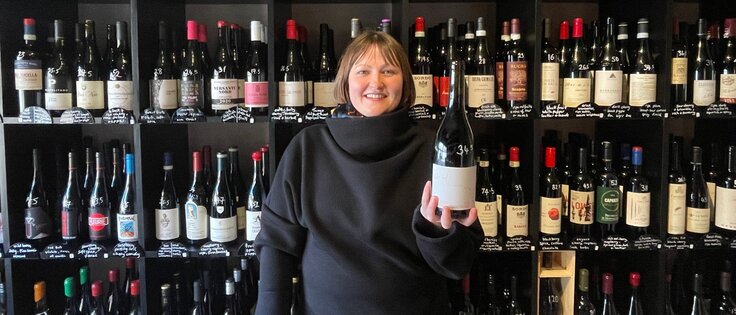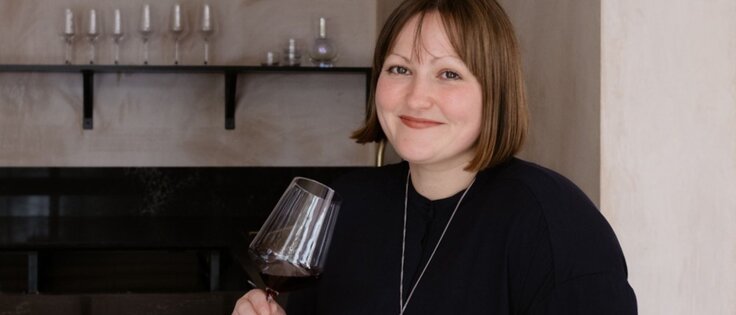
Article
6 min read
Why training and variety are the cherries on top of all good hospitality careers
Kitty Finstad
May 22, 2024
What's on the menu
Meet the team
- Who: Hayley Try Carreira
- Role: Owner
- Business: Drop Dulwich
- Where: East Dulwich, London
That serves up
- A lifetime of industry experience
- A can-do attitude
- Variety and training that keeps teams sharp and engage
From working front-of-house at The Ledbury and Hakkasan to operations manager at José Pizarro Group, native Aussie Hayley Try Carreira is a self-described ‘hospitality lifer’ who has used Planday in several of her roles . These days you’ll find her behind the bar at Drop Dulwich, her wine bar/retail shop/one-hour delivery service in southeast London, where a six-day week is par for the course. On a sunny day in early spring, she sat down with Kitty Finstad to talk about the challenges of running a small business, being part of a hospitality family and why the best hospo careers are made with lots of training and trying new things.

Hospitality’s changing nature
Hayley, what’s it like to be your own boss after so many years spent working within other hospitality businesses?
Well, now I do everything! But I’ve worked with so many other talented people doing their best at the roles I roll into one, so I have a lot of good experiences and observations to call on. I also have a clear view of how much money needs to be spent in order to run a successful business – and one of the biggest costs in hospitality is staff.
I guess you’ve seen some pretty dramatic changes in what people expect now as they enter the industry. Costs for everything are going up, and that includes salary expectations.
People want more money, for sure, sometimes regardless of experience level – because everyone has bills to pay. So you’re paying more now for people who need more training. I would describe myself as ‘old-school hospitality’, coming from a culture where no one blinked at working 60 hours a week, 16 hours a day and getting paid peanuts, because we loved it. And I still love it, but I’m glad the industry has changed in that way – it’s better for everyone.
It is, but there are a lot of people who’ve been in the industry for decades who seem to miss the ‘good old days’ even though they acknowledge that we work in better times now. What’s your response to that attitude?
Well, I think you just have to work harder to understand this new generation and stop referring to what hospitality was in the past. The reality now is that you have to invest in training, training, training. People are never going to get better at their jobs unless you invest in them. And look, hospitality is always going to be a revolving door to some extent – people coming in fresh, wanting a lot of training, investment and your time, which you’re happy to give them – but they won’t always stay and you have to accept that and focus on the people who do want to stay and what you can do for them.
And what can you do for those people who commit, who want a career, who want to stay? What’s this new breed of hospitality workers looking for?
I’ve hired a lot of people fresh into the industry over the years and I admire that they have the courage and the space to say: ”I’m not going to work 60 hours a week and give myself over completely to this job – I have other interests and things I want to pursue.” But as a business owner who is totally committed, this can be a challenge to your mindset.
I think that ‘all-in’ mindset is common among small business owners in any sector. So how do you foster that same loyalty among staff?
First off, you’ve got to be happy where you work. One thing that José Pizarro [the Spanish chef with a portfolio of eight venues in London, Spain and Abu Dhabi] does extremely well is that he makes sure his team are always doing different things. Restaurant service can get quite repetitive over time and you can quickly feel like you’ve learned all you can.
But there’s always more to learn if you create the opportunity. José is really active himself; he goes to loads of events and brings his team with him to try new things, work in new venues and environments, develop new dishes and deliver different kinds of service.
The right skills for the job
Drop Dulwich is quite a different format from the restaurants you’ve worked in. What kind of skills does it demand?
Well, a wine bar is certainly a different model to a restaurant, and the cost structures are different. For one thing, we have no chefs. I love chefs, I’m married to a chef, most of my friends are chefs! But what I noticed as we came out of the pandemic was that suddenly chefs were wanting to work half the hours at double the pay. Do they deserve that? Absolutely. But for small businesses, that’s an unsustainable proposition. Until we see a wider rollout of increased menu prices to pay for all the other increases, including staffing, we’re going to have to find other ways to respond to what people want and what might make them stay.
What’s your solution to running a chef-free business that serves food?
We buy in really good products that other people make – and yes, we pay more for those products, but we don’t have the overhead of a chef preparing them. Instead, we train people on food hygiene standards, how to put plates together, how to heat up an empanada in the oven, or plate some anchovies with some lemon zest and olive oil and make it look attractive… fairly basic things that we can train anyone to do right. Sounds uncomplicated, but it’s still satisfying to master something you might not have known how to do before.
And I guess when everyone receives the same training, they can quality-control each other’s work?
Exactly. For example, we never have anyone working evenings by themselves – that’s for safety reasons too – but it also means you’ve always got people cross-checking each other to make sure the standards we set are always being met. That’s one of the things I’ve learned from past experience and applied on a much smaller scale to my small business. We only have five staff and only two are full-time – and one of those is me. The other three part-time roles do between 12 and 25 hours a week and they have other things going on – side projects or studying.

Balancing work, life and everything else
So work-life balance isn’t really an issue for part-time roles…
Not so much, but we still look out for each other. What’s great about the younger generation is their openness in talking about how they’re feeling. Whereas my generation would fall in a heap after working 16 hours and never talk about how important it is to go to the gym on your day off or fit in a swim or some yoga before or after a shift. Everyone is quite conscious of that and I think it’s a really good thing. We’ve also had staff who have flagged up when they’re not having a great day. That’s good to know, because then I can say, “Instead of being on the floor tonight, where you’d have to talk to lots of people, why don’t you work the kitchen and just focus on plating food and having a quieter shift?”
How flexible can you be with shifts with so few staff?
Well, one thing I’ve controlled from the start are the hours. In restaurants, it’s not unusual to finish at one or two in the morning. Here, the latest anyone out is 11 o’clock. And if there’s an opportunity to go home early because we’re not busy, we offer that. At the end of the day, we want everyone to be happy. When people are happy at work, the guests feel it and they come back.
You’re running a business. Your husband also works in hospitality. You have a young child. How do you do it all and stay happy yourself?
I’d be lying if I said it wasn’t challenging! I want to give 100% to my son, 100% to my husband, 100% to my business. And it’s hard – hospitality careers aren’t really geared up for families. I have to be really, really organised. And I think that organisation benefits my team as well. Here at Drop, I do rotas one month in advance. Leandro [Carreira, Hayley’s chef husband] doesn’t – it’s one of the few things we ever gripe to each other about. Every week we talk about what our next two weeks look like and we shuffle things around when we have to. But would we change anything? No way. I love hospitality. I love being with our regulars and seeing my staff develop and learn – for me, there’s no better industry for making people happy.
More work/life balance
If you liked that, you'll love this

How to scale your training and development programs
Scaling training and development programs can pose a significant challenge to a growing business, but it’s an absolute necessity.

Should I train my current employees or hire new skilled workers?
As a business manager, you want to have the best talents in the business. Should you hire from outside or do you simply train your existing employees? That is the dilemma that many supervisors face
